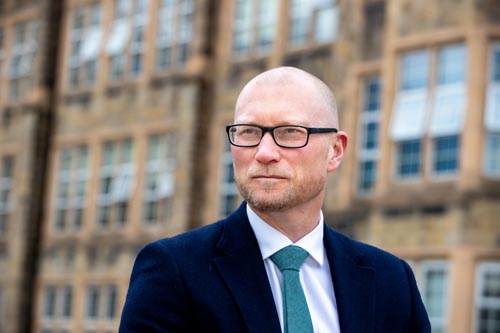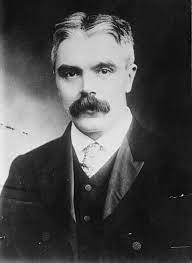A ‘face for radio’…that’s me! It’s proved so again, warbling away about Bradford Grammar School on BBC Radio Leeds …
A notable Old Bradfordian (alumnus) was the topic of conversation, Sir Frank Dyson to be precise, whose picture sits proudly top right in a gallery of other OBs on our ‘Notable OBs’ webpage.
Dyson was born in Leicestershire in 1868. His father was the Reverend Watson Dyson, a Baptist minister, his mum was Frances. The family moved to Yorkshire in Frank’s youth. Here, he attended Heath Grammar School, Halifax and subsequently moved to BGS where he completed the majority of his schooling in the late 1870s to mid-1880s.
Frank was a bright lad, a hardworking and ambitious one too, with a strong moral compass. After BGS he won a place at Trinity College, Cambridge, to read mathematics and astronomy. Years after as an OB and Fellow of Trinity College, he became a regular attendee at annual dinners and an enthusiastic participant at post-dinner, late night drinking sessions – so it’s safe to assume he enjoyed good company and was a bit of character too.
More formally, The Royal Museums of Greenwich record the following:
“In 1894 he accepted the post of chief assistant at the Royal Observatory, Greenwich, under William Christie. Dyson’s task was measuring the positions of stars for the observatory’s contribution to the ‘International Astrographic Catalogue’. In 1906 he took up the posts of Astronomer Royal for Scotland and Regius Professor of Astronomy at Edinburgh University. When Christie retired in 1910, Dyson returned to Greenwich as the ninth Astronomer Royal. He became interested in solar eclipses, organising a number of expeditions and developing eclipse spectroscopy. In 1917 he explained that the solar eclipse, due in 1919, could be used to provide an observational test for Einstein’s general theory of relativity. The theory predicted that stars seen close to the eclipsed sun would appear to be shifted by a small but measurable distance. Dyson presented his observation findings at the Royal Astronomical Society late in 1919, showing that the collected data supported Einstein’s prediction. Dyson’s work at the Royal Observatory also required an interest in the measurement of time. He introduced the short free-pendulum clock for the time service in 1924 … He was knighted in 1915 and appointed KBE in 1926. He retired in 1933 and died at sea on board the Ascanius returning from Australia on 25 May, 1939. He was buried at sea the same day”.
And the reason for the radio broadcast and this blog?
In 1923, Dyson approached John Reith, then Director General of the BBC, asserting that the Greenwich time signals should be available to the public. A groundbreaking broadcast of Big Ben chiming in the New Year had proved to be successful and popular and the six pips followed swiftly after, on the airwaves for the first time on 5 February 1924. The BBC pips, broadcast from Greenwich until 1939, celebrate their 100th birthday next week.
Dyson came to BGS at a time when the school was wrestling itself out of the doldrums and beginning its rise to national attention. BGS was the first school in the country to take up the reforms of the Forster Education Acts of the late 1800s which moved control of the school away from the church and into the hands of the state.
At about the same time, the Reverend William Keeling took up the headship and began his 44-year campaign to improve academic standards, in part by persuading the Governors to institute a far-reaching scholarship programme for bright boys whose families could not afford the fee. Keeling transformed Bradford Grammar School; Dyson was one of his scholarship boys, from a humble background but at a school where he could excel.
Today, BGS supports scholarships for academically gifted children, and these are available to all. But the majority of fee assistance is directed towards means tested awards, also for bright children of great potential, but from families who wouldn’t otherwise be able to attend. These awards safeguard the inclusivity and character of our down to earth, but high achieving and cosmopolitan school. In essence, assisted place awards enable BGS to welcome and polish up the next generation of diplomats, artists, entrepreneurs and Greenwich astronomers. We are grateful to the many benefactors who donate to our 1662 Fund to make this possible.
Sir Frank Dyson will be remembered in assembly and through various BGS media channels. And every day, our BGS version of the pips – half BBC / half battleship claxon – signal the end of lessons, the start of lunch and so on. In a fashion, Dyson’s legacy is alive and well in the everyday soundscape of BGS.
“The BBC pips, broadcast from Greenwich until 1939, celebrate their 100th birthday next week.”

